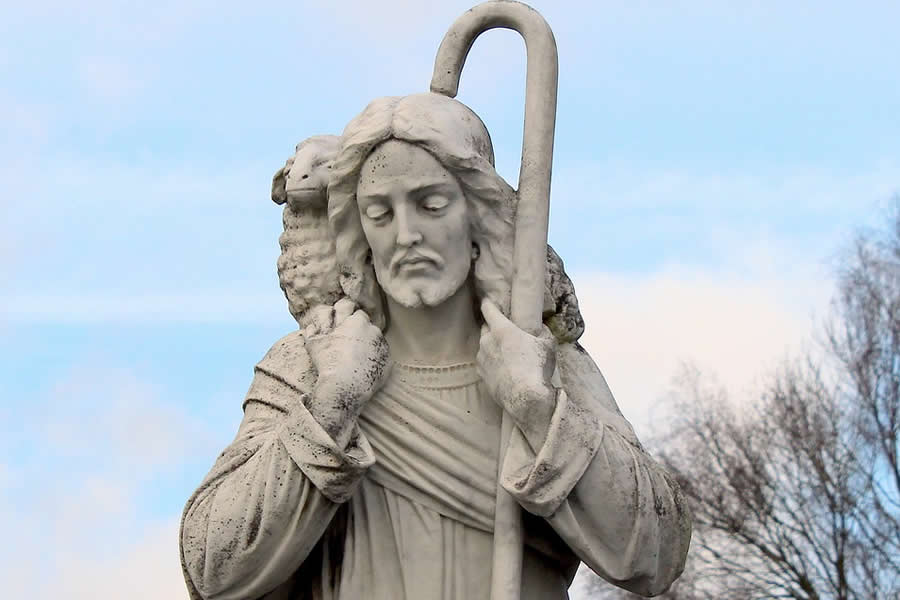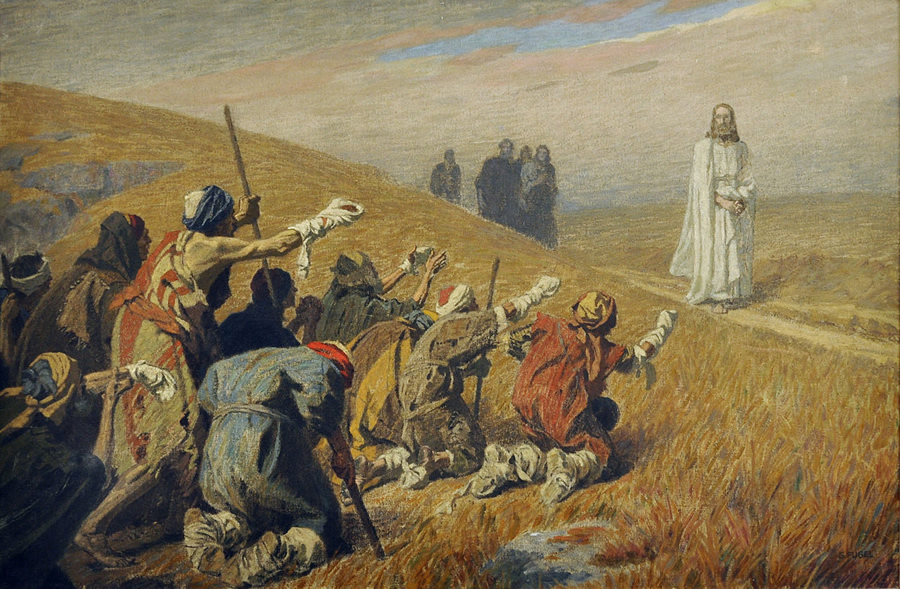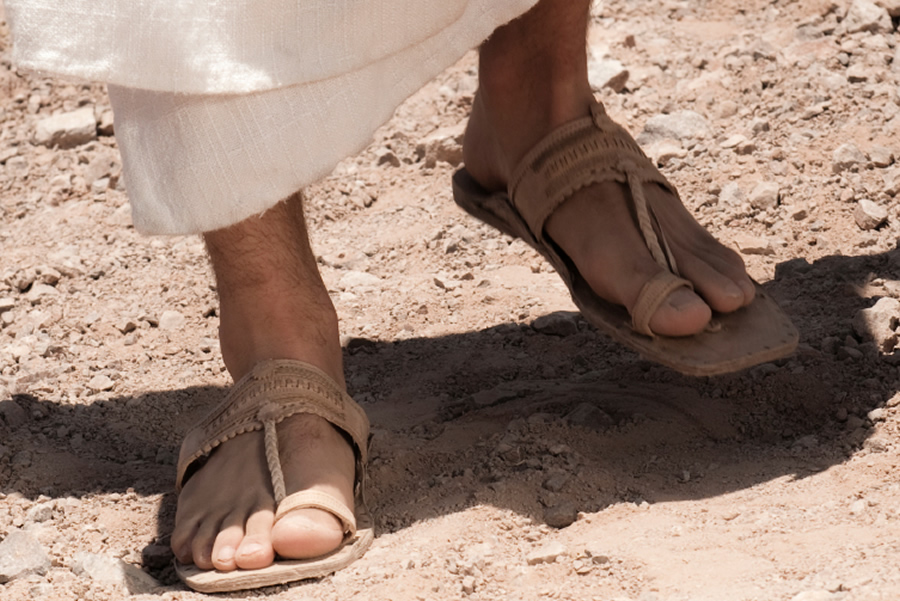St. Francis of Assisi Weekly Reflections

Do You Feel Empathy for Others Suffering?
11-24-2019Weekly ReflectionWe Celebrate Worship Resource, Vol. 44, No. 3It is difficult to do what is right when everyone else is doing the opposite. It is especially difficult if you’re in pain or under duress. Luke tells us that pretty much everyone verbally abused Jesus as he hung on the cross. The rulers sneered at him, the soldiers jeered at him, even a criminal reviled him. It would have been very easy for the other criminal, in pain and agony himself, to join in. But he did not. This man, he realized, was innocent. Perhaps he really was a king. A king could release a prisoner on special occasions. Even Pilate, who governed Judea, had this power, using it that very morning to release Barabbas, basically forgiving him for his crimes and giving him his freedom. So this criminal, remorseful for his sins, believing that the innocent man suffering alongside him was a king, humbly asks him for forgiveness and freedom. Jesus, king of a world yet unseen, used that power to release this prisoner, to release him from captivity of sin and death. The penitent thief becomes the first to “share in the inheritance of the holy ones in light” (Colossians 1:12).
When you are suffering, can you feel empathy for other who are suffering as well? How do you act?
¿Sientes Empatía por el Sufrimiento de Otros?
Es difícil hacer lo correcto cuando todos los demás están haciendo lo contrario. Es especialmente difícil si tiene dolor o está bajo presión. Lucas nos dice que casi todos abusaron verbalmente de Jesús mientras colgaba de la cruz. Los gobernantes se burlaron de él, los soldados se burlaron de él, incluso un criminal lo injurió. Hubiera sido muy fácil para el otro criminal, con dolor y agonía, unirse. Pero no lo hizo. Este hombre, se dio cuenta, era inocente. Quizás él realmente era un rey. Un rey podía liberar a un prisionero en ocasiones especiales. Incluso Pilato, que gobernó Judea, tenía este poder, usándolo esa misma mañana para liberar a Barrabás, básicamente perdonándole por sus crímenes y dándole su libertad. Entonces este criminal, arrepentido por sus pecados, creyendo que el hombre inocente que sufría junto a él era un rey, humildemente le pide perdón y libertad. Jesús, rey de un mundo aún invisible, usó ese poder para liberar a este prisionero, liberarlo del cautiverio del pecado y la muerte. El ladrón penitente se convierte en el primero en “participar en la herencia de su pueblo santo, en el reino de la luz.” (Colosenses 1:12).
Cuando estás sufriendo, ¿puedes sentir empatía por otros que también están sufriendo? ¿Cómo actúas?

Faith, Hope, and Love
11-17-2019Weekly ReflectionWe Celebrate Worship Resource, Vol. 44, No. 3Apocalyptic images fill the readings today. Fire and earthquakes, famine and war. These phenomena were regarded as signs of the end of the world, and still are today. In fact, sometimes it seems that natural disasters and man-made horrors have become even more common. To the list above we can now add mass shootings and terrorism, pandemics and global warming. What do we do in the face of such tragedy and threats? Some of us are tempted to panic. We might run around in a disorderly way, like some of the Thessalonians of Paul’s time. Maybe we just resign ourselves to the horror and misery. After all what can we do? Jesus would have none of that. “Do not be terrified,” Jesus counsels his audience (Luke 21:9). Instead, persevere. The virtues of faith, hope, and love should continue to guide the way we act, no matter how traumatic the news is on any given day. “By your perseverance you will secure your lives” (Luke 21:19). Paul provides a model, continuing to work quietly to build up the kingdom in the midst of persecution. After all, in the end, “the sun of justice with its healing rays” will rise (Malachai 3:20).
What do you do when faced with a steady barrage of tragic news? What gives you hope?
Fe, Esperanza, y Amor
Las imágenes apocalípticas llenan las lecturas de hoy. Fuego y terremotos, hambre y guerra. Estos fenómenos fueron considerados como signos del fin del mundo, y todavía lo son hoy. De hecho, a veces parece que los desastres naturales y los horrores provocados por el hombre se han vuelto aún más comunes. A la lista anterior ahora podemos agregar tiroteos masivos y terrorismo, pandemias y calentamiento global. ¿Qué hacemos ante semejante tragedia y amenazas? Algunos de nosotros estamos tentados a entrar en pánico. Podríamos correr de manera desordenada, como algunos de los tesalonicenses de la época de Pablo. Tal vez simplemente nos resignamos al horror y la miseria. Después de todo, ¿qué podemos hacer? “Que no los domine el pánico,” Jesús aconseja a su audiencia (Lucas 21:9). En cambio, persevera. Las virtudes de la fe, la esperanza y el amor deben seguir guiando la forma en que actuamos, sin importar cuán traumática sea la noticia en un día determinado. “Si se mantienen firmes, conseguirán la vida.” (Lucas 21:19). Pablo proporciona un modelo, que continúa trabajando en silencio para construir el reino en medio de la persecución. Después de todo, al final, “brillará el sol de la justicia, que les traerá la salvación en sus rayos.” (Malaquías 3:20).
¿Qué haces ante un bombardeo constante de noticias trágicas? ¿Qué te brinda esperanza?

Eternal Life with God
11-10-2019Weekly ReflectionWe Celebrate Worship Resource, Vol. 44, No. 3Poor Sadducees! Unable to imagine a resurrection after one’s earthly life they instead imagine conundrums that make the belief in resurrection look foolish. When someone remarries, who will be their spouse after the resurrection? Someone is going to be left out. Jesus patiently explains to them that this is not an issue in the coming age. The Sadducees have made the mistake of assuming resurrected life is a continuation of earthly life. They have failed to imagine anything other than life as they as they know it her on earth. With God, remember, all things are possible. Eternal life can be more wonderful than we can imagine. We believe that all God’s people are alive in God, for our God is the God of the living. Therefore, the seven brothers and their mother in the first reading face torture and death with unwavering courage, for they believe they will be “raise(d) up to live again forever” (2 Maccabees 7:9). Jesus, and later Saint Paul, would do the same. We hope to die confidently, believing in a God who can image more than we possibly can. Especially in November, we remember our loved ones who have died, imagining their eternal life with God and in God forever.
How do you image eternal life with God?
Vida Eterna con Dios
Pobres saduceos! Incapaces de imaginar una resurrección después de la vida terrenal, se imaginan acertijos que hacen que la creencia en la resurrección parezca tonta. Cuando alguien se vuelve a casar, ¿quién será su cónyuge después de la resurrección? Alguien va a quedar fuera. Jesús les explica pacientemente que esto no es un problema en la era venidera. Los saduceos han cometido el error de asumir que la vida resucitada es una continuación de la vida terrenal. No han podido imaginar otra cosa que no sea la vida tal como la conocen en la tierra. Con Dios, recuerda, todas las cosas son posibles. La vida eterna puede ser más maravillosa de lo que podemos imaginar. Creemos que todo el pueblo de Dios está vivo en Dios, porque nuestro Dios es el Dios de los vivos. Por lo tanto, los siete hermanos y su madre en la primera lectura enfrentan la tortura y la muerte con un coraje inquebrantable, porque creen que serán “resucitados a una vida eterna” (2 Macabeos 7:9). Jesús, y luego San Pablo, harían lo mismo. Esperamos morir en confianza, creyendo en un Dios que puede imaginar más de lo que posiblemente podamos nosotros. Especialmente en noviembre, recordamos a nuestros seres queridos que han muerto, imaginando su vida eterna con Dios y en Dios para siempre.
¿Cómo imaginas la vida eterna con Dios?

Have You 'Blossomed' in the Eyes of the Lord?
11-03-2019Weekly ReflectionWe Celebrate Worship Resource, Vol. 44, No. 3Witness Zacchaeus in the sycamore tree. So eager to see Jesus, but too short. Lost in the crowd. Desperate to see over their heads. He has an idea! Running ahead and climbing a tree, he bursts into the Lord’s vision, like an oversized bud on a tree in bloom. His faith has blossomed. Jesus, on the road to Jericho, hadn’t planned on stopping. But he “has come to seek and to save what was lost” (Luke 19:10), and he sees Zacchaeus, in full flower, ripe to be picked. So he calls him down and invites himself to his house. Zacchaeus’s jubilation overflows. He comes down from the tree. But now, back down on the ground, Zacchaeus is brought low once again. The crowd grumbles. He is not worthy! He steals from us! He collaborates with the Romans! But Zacchaeus is a new man now. He has blossomed. I will give away my riches! Half of what I have I will give to the poor! I will give back fourfold anything I have stolen! Zacchaeus, once lost in the crowd, now rises out of it. Salvation has come to his house in the person of Jesus.
How can you “blossom” in the eyes of the Lord?
¿Has 'Florecido' en los Ojos del Señor?
Observemos a Zaqueo en el árbol de sicómoro. Muy ansioso por ver a Jesús, pero demasiado bajito. Perdido en la multitud. Desesperado por ver sobre sus cabezas. ¡Él tiene una idea! Corriendo hacia adelante y trepando a un árbol, irrumpe en la visión del Señor, como un brote de gran tamaño en un árbol florido. Su fe ha florecido. Jesús, en el camino a Jericó, no había planeado detenerse. Pero él “ha venido a buscar y a salvar lo que se había perdido” (Lucas 19:10), y ve a Zaqueo, en plena flor, maduro y listo para ser recogido. Entonces lo llama y se invita a su casa. El júbilo de Zaqueo se desborda. Él baja del árbol. Pero ahora, de vuelta en el suelo, Zaqueo es derribado una vez más. La multitud se queja. ¡No es digno! ¡Él nos roba! ¡Colabora con los romanos! Pero Zaqueo es un hombre nuevo ahora. El ha florecido. ¡Regalaré mis riquezas! ¡La mitad de lo que tengo se lo daré a los pobres! ¡Devolveré cuatro veces todo lo que he robado! Zaqueo, una vez perdido en la multitud, ahora se levanta. La salvación ha llegado a su casa en la persona de Jesús.
¿Cómo puedes “florecer” en los ojos del Señor?

The Humble Will Be Exalted
10-27-2019Weekly ReflectionWe Celebrate Worship Resource, Vol. 44, No. 3You can do it!” feels as though it could be the mantra of our age. We hear it all the time, on TV commercials, in self-help exercises, on social media. “You can do it!” we assure a friend who is tying to accomplish something special. “I can do it!” we convince ourselves when we face a challenge. The Pharisee in today’s Gospel would certainly agree. By outward appearance, he is a person today’s Gospel would certainly agree. By outward appearance, he is a person worthy of praise. He is honest and generous, he fasts and gives alms. The problem is that he fails to see the source of these qualities and actions. He feels that he, and he alone, deserves the credit. Therefore, he holds himself about those who struggle to do it or just cannot do it, what he dismisses as “the rest of humanity” (Luke 18:11). The “rest of humanity,” however, understands that they cannot do it alone. They—we—are dependent, on God and on others. It is the rest of humanity who are affirmed in Sirach: the weak, the oppressed, the orphan, the widow. It is the rest of humanity who are consoled by Saint Paul, longing for the Lord. It is the rest of humanity who are praised by Jesus: “the one who humbles himself will be exalted” (Luke 18:14).
How do you put yourself above others?
El Humilde Será Exaltado
Puedes hacerlo!” se siente como si pudiera ser el lema de nuestra época. Lo escuchamos todo el tiempo, en comerciales de televisión, en ejercicios de autoayuda, en las redes sociales. “¡Puedes hacerlo!” le aseguramos a un amigo que está tratando de lograr algo especial. “¡Puedo hacerlo!” nos convencemos a nosotros mismos cuando enfrentamos un desafío. El fariseo en el Evangelio de hoy ciertamente estaría de acuerdo. Por su apariencia externa, él es una persona que el Evangelio de hoy ciertamente estaría de acuerdo. Por su apariencia externa, es una persona digna de elogio. Es honesto y generoso, ayuna y da limosna. El problema es que no puede ver la fuente de estas cualidades y acciones. Él siente que él, y solo él, merece el crédito. Por lo tanto, se sostiene sobre aquellos que luchan por hacerlo o simplemente no pueden hacerlo, lo que él descarta como “los demás hombres” (Lucas 18:11). Sin embargo, el “los demás hombres” comprenden que no pueden hacerlo solos. Ellos, nosotros, dependemos de Dios y de los demás. Es el resto de la humanidad quien se afirma en Sirach: los débiles, los oprimidos, los huérfanos, las viudas. Es el resto de la humanidad quien es consolado por San Pablo, anhelando al Señor. Es el resto de la humanidad quien es alabado por Jesús: “el que se humilla será enaltecido” (Lucas 18:14).
¿Cómo te pones por encima de los demás?

Pray Always Without Becoming Weary
10-20-2019Weekly ReflectionWe Celebrate Worship Resource, Vol. 44, No. 3Again and again, Jesus encouraged his disciples to pray. After all, he knew that soon he would be separated from them and this would be the way that they could continue to keep in touch. But Jesus didn’t just talk the talk, he truly walked the walk. Especially in Luke’s Gospel, Jesus prayed constantly and persistently. He provided a model for his disciples and for us. He knew we would not always find it easy. When we face frequent disappointment, illness, heartache, or failure, we can become discouraged. The widow in today’s Gospel easily could have lost heart, especially since she had to deal with uncaring judge. But she persisted. The lesson: “Pray always without becoming weary” (Luke 18:1). Moses does just that in the first reading. He lifted up his arms to heaven, and with the help of Aaron and Hur, kept them raised all day to ensure Joshua’s success against Amalek. Likewise, Paul encouraged Timothy to remain faithful and to persist. We too are called to be persistent and faithful in prayer. In doing so, we are brought into communion with God, for God is always faithful to us.
Do you persist in praying even when you feel your prayers are not heard? Do you feel in communion with God and with others when you pray?
Oren Siempre y Sin Desfallecer
Una y otra vez, Jesús alentó a sus discípulos a orar. Después de todo, sabía que pronto se separaría de ellos y que esa sería la forma en que podrían continuar manteniéndose en contacto. Pero Jesús no solo habló, sino que realmente caminó el camino. Especialmente en el Evangelio de Lucas, Jesús oró constantemente y con persistencia. Jesús proporcionó un modelo para sus discípulos y para nosotros. Sabía que no siempre sería fácil. Cuando nos enfrentamos a frecuentes decepciones, enfermedades, angustias o fracasos, podemos desanimarnos. La viuda en el Evangelio de hoy fácilmente podría haberse desanimado, especialmente porque tuvo que lidiar con un juez indiferente. Pero ella persistió. La lección: “Oren siempre sin y desfallecer” (Lucas 18:1). Moisés hace exactamente eso en la primera lectura. Levantó los brazos al cielo y, con la ayuda de Aarón y Jur, los mantuvo levantados todo el día para garantizar el éxito de Joshua contra Amalec. Del mismo modo, Pablo alentó a Timoteo a permanecer fiel y persistir. Nosotros también estamos llamados a ser persistentes y fieles en la oración. Al hacerlo, somos traídos a la comunión con Dios, porque Dios siempre es fiel a nosotros.
¿Persistes en oración aun cuando sientes que tus oraciones no son escuchadas? ¿Te sientes en comunión con Dios y con los demás cuando oras?

Make Time for Gratitude
10-13-2019Weekly ReflectionWe Celebrate Worship Resource, Vol. 44, No. 3Thanksgiving Day is still a month or so away, but thanksgiving is the dominant theme of the reading today. We are taught from an early age to say “thank you” whenever we are given something, but as we go through life, sometimes we forget to say it or even to feel grateful. Today, however, we hear of two people who are truly thankful and take the time and effort to express that gratitude. When Naaman is healed of leprosy, he immediately returns to Elisha with a gift and a sincere desire to worship the God of Israel. In the Gospel, the unnamed Samaritan immediately returned to thank Jesus and glorify God. He and Naaman are models for us today as we gather for the Eucharist, since that word eucharistia means “thanksgiving.” As we listen to these accounts of two foreigners who return to give thanks and then together we celebrate the Eucharist, let us resolve to live with thankful hearts, finding joy in all the good things that have been done for us, and taking the time to thank God and each other for these blessings.
To whom do you need to give thanks today? How can you live with a more thankful heart?
Dedica Tiempo para la Gratitud
Aún falta un mes para el Día de Acción de Gracias, pero la gratitud es el tema que domina la lectura de hoy. Desde temprana edad se nos enseña a dar las “gracias” cada vez que recibimos algo, pero a medida que avanzamos en la vida, a veces olvidamos decirlo o incluso sentirnos agradecidos. Hoy, sin embargo, escuchamos de dos personas que están verdaderamente agradecidas y se toman el tiempo y el esfuerzo para expresar esa gratitud. Cuando Naamán se sanó de la lepra, inmediatamente regresó a Eliseo con un regalo y un sincero deseo de adorar al Dios de Israel. En el Evangelio, el samaritano sin nombre regresó inmediatamente para agradecer a Jesús y glorificar a Dios. Él y Naamán son modelos para nosotros hoy al reunimos para la Eucaristía, ya que la palabra eucaristía significa “dar gracias”. Mientras escuchamos estos relatos de dos extranjeros que regresan para dar gracias y luego juntos celebramos la Eucaristía, resolvamos vivir con corazones agradecidos, encontrar alegría en todas las cosas buenas que se hemos recibido y tomarse el tiempo para dar gracias a Dios y a los demás por estas bendiciones.
¿A quién necesitas agradecer hoy? ¿Cómo puedes vivir con un corazón más agradecido?

Faith Gives Us Strength
10-06-2019Weekly ReflectionWe Celebrate Worship Resource, Vol. 44, No. 3Even a tiny amount of faith can lead one to do great things. God tells a doubting Habakkuk that his faith will allow him to withstand destruction and violence. Saint Paul assures Timothy that faith will give him strength to proclaim the gospel. Jesus compares faith to a tiny mustard seed uprooting a giant mulberry, a tree with a wide, expansive root system. But then Jesus shifts the perspective. He reminds his disciples that to be a disciple is to be a servant. A servant is expected to serve, not to seek a reward. A servant’s reward comes only in due time. Perhaps the key to each reading is patience. It takes time to reach the ultimate reward. Habakkuk sees only the misery in Judah as Babylon is preparing to invade. Paul is imprisoned. Timothy feels weak. The disciples fear they are lacking in faith. But have patience. Eventually a tiny seed grows into a great tree. “The just one, because of [his or her] faith, shall live” (Habakkuk 2:4). Timothy and Paul’s faith gives them the strength to bear all kinds of hardship for the gospel. The disciples’ faith is enough. Each just requires patience.
How can I strengthen my patience? How does faith help?
La Fe Nos Da Fuerza
Hasta una pequeña cantidad de fe puede llevar a uno a hacer grandes cosas. Dios le dice a Habacuc el dudoso, que su fe le permitirá resistir la destrucción y la violencia. San Pablo le asegura a Timoteo que la fe le dará fuerzas para proclamar el evangelio. Jesús compara la fe con una pequeña semilla de mostaza que desarraiga una morera gigante, un árbol con un sistema de raíces amplio y expansivo. Pero entonces Jesús cambia la perspectiva. Les recuerda a sus discípulos que ser discípulo es ser un sirviente. Se espera que un sirviente sirva, no busque una recompensa. La recompensa de un sirviente llega solo a su debido tiempo. Quizás la clave de cada lectura sea la paciencia. Se necesita tiempo para alcanzar la recompensa final. Habacuc solo ve la miseria en Judá cuando Babilonia se prepara para invadir. Pablo está encarcelado. Timothy se siente débil. Los discípulos temen que les falta fe. Pero tienen paciencia. Finalmente, una pequeña semilla se convierte en un gran árbol. “El justo vivirá por su fe” (Habacuc 2:4). La fe de Timoteo y de Pablo les da la fuerza para soportar todo tipo de dificultades por el evangelio. La fe de los discípulos es suficiente. Solo requieren paciencia.
¿Cómo puedo fortalecer mi paciencia? ¿Cómo ayuda la fe?

How Much Do You Love Your Neighbor?
09-29-2019Weekly ReflectionWe Celebrate Worship Resource, Vol. 44, No. 3The love of money,” Saint Paul wrote to Timothy, “is the root of all evils”(1 Timothy 6:10). Tough this line falls just outside the passage we hear today, it resonates powerfully with both the first reading and the Gospel. The “complacent” of Zion, “stretched comfortably on their coaches,” loved the lifestyle afforded by their wealth (Amos 6:4). So did the rich man in Jesus’ parable, who “dined sumptuously each day” (Luke 16:19). Neither awoke from their dream life until it was too late. The rich of Zion lost it all in exile. The rich man ended up living in torment in the netherworld. Abraham speaks of “a great chasm” separating heaven and hell (Luke 16:26), but it only reflects the chasm the rich man carved out during his life. The chasm kept the unsightly and smelly Lazarus away. Clearly, the rich man’s love was directed toward his wealth, not toward his neighbor. Perhaps Paul had this in mind when he advised Timothy, “Tell (the rich) to do good,. . .to be generous, ready to share” (1 Timothy 6:18). Jesus taught love of God and love of neighbor. Love of money is a chasm that separates us from those ideals.
Have I created chasm between myself and poor, filthy Lazarus? How can I bridge it before it’s too late?
¿Cuánto Amas a Tu Prójimo?
El amor al dinero”, escribió San Pablo a Timoteo, “es la raíz de todos los males” (1 Timoteo 6:10). Aunque esta línea cae justo afuera del pasaje que escuchamos hoy, resuena poderosamente tanto en la primera lectura como en el Evangelio. Los “que se sienten seguros” en Sión, “recostados sobre almohadones”, amaban el estilo de vida que les brindaba su riqueza (Amós 6:4). Lo mismo hizo el hombre rico en la parábola de Jesús, que “banqueteaba espléndidamente cada día” (Lucas 16:19). Ninguno de los dos despertó de la vida de sus sueños hasta que fue demasiado tarde. Los ricos de Sion lo perdieron todo en el exilio. El hombre rico terminó viviendo en tormento en el infierno. Abraham habla de “un abismo inmenso” que separa el cielo y el infierno (Lucas 16:26), pero solo refleja el abismo que el hombre rico forjó durante su vida. El abismo mantenía alejado al desagradable y maloliente Lázaro. Claramente, el amor del hombre rico se dirigió hacia su riqueza, no hacia su prójimo. Quizás Pablo tenía esto en mente cuando le aconsejo a Timoteo: “Mándales (a los ricos) que hagan el bien,. . . que sean generosos, dispuestos a compartir” (1 Timoteo 6:18). Jesús enseñó el amor a Dios y el amor al prójimo. El amor al dinero es un abismo que nos separa de esos ideales.
¿He creado un abismo entre mí y el pobre y sucio de Lázaro? ¿Cómo puedo cerrarlo antes de que sea demasiado tarde?

Where do You Put Your Faith, Worldly Goods or God?
09-22-2019Weekly ReflectionWe Celebrate Worship Resource, Vol. 44, No. 2You cannot serve both God and mammon,” Jesus says after telling his disciples an unusual parable (Luke 16:13). It would have been easy to draw the wrong conclusion, even though they were familiar with the practices of the time regarding stewards, masters, and debtors. Jesus wants to make sure his disciples realize that in the end they must choose between two things. Will they put their faith in worldly goods or in God? The prophet Amos makes it clear where he stands, blasting those “who trample upon the needy and destroy the poor of the land” (Amos 8:4). In his letter to Timothy, Paul hopes the church in Ephesus may “lead a quiet and tranquil life in all devotion and dignity” (1 Timothy 2:2). The dishonest steward, wishing for a tranquil life neither manual labor nor begging, uses wealth to make friends, who he hopes will welcome him when he’s out of a job. But one cannot be devoted to both heavenly and worldly wealth. One must be placed in service of the other. May we follow the lesson of Jesus, Amos and Paul.
How does my pursuit of higher income and greater wealth prevent me from serving God?
¿Dónde Pones Tu Fe, En Bienes Mundanos o en Dios?
No puedes servir a Dios y a las riquezas”, dice Jesús después de contarles a sus discípulos una parábola inusual (Lucas 16:13). Hubiera sido fácil llegar a una conclusión incorrecta, a pesar de que estaban familiarizados con las prácticas de la época con respecto a los mayordomos, maestros y deudores. Jesús quiere asegurarse de que sus discípulos se den cuenta de que al final deben elegir entre dos cosas. ¿Pondrán su fe en los bienes mundanos o en Dios? El profeta Amós deja en claro dónde se encuentra, criticando a los “que buscan al pobre sólo para arruinarlo” (Amós 8:4). En su carta a Timoteo, Pablo espera que la iglesia en Éfeso pueda “llevar una vida tranquila y en paz, entregada a Dios y respetable en todo sentido” (1 Timoteo 2:2). El mayordomo deshonesto, que desea una vida tranquila sin trabajo manual ni en pordioseo, usa la riqueza para hacer amigos, que espera que lo reciban cuando no tenga trabajo. Pero uno no puede dedicarse tanto a la riqueza celestial como a la mundana. Uno debe ser puesto al servicio del otro. Que sigamos la lección de Jesús, Amós y Pablo.
¿Cómo mi búsqueda de mayores ingresos y más riquezas me impide servir a Dios?

Rejoice
09-15-2019Weekly ReflectionWe Celebrate Worship Resource, Vol. 44, No. 2What a blessing it is when we find what we’ve lost, what we feared we might never see again. Today’s readings feature stories of just such blessings: a coin, a sheep, a people. All could easily have been written off, but all are found, welcomed back, forgiven. In Exodus, the Lord wants to strike down the Israelites who turned to a golden calf. Moses convinces God that these people who had been rescued from captivity, who were linked to Abraham and Isaac, were worth saving. The Lord relented. In the Gospel, the shepherd rescues the sheep that wandered off, the woman searches for the coin that was lost, and the father lavishly welcomes home his wayward son. “Rejoice,” each of them calls out to friends and neighbors, for what was lost has been found. The scribes and Pharisees would have considered the effort a waste of time. They complained that Jesus spent his time with those who lived in sin. That is the point, Jesus says, for it is the repentant sinner who brings joy to God. As Paul points out in his letter to Timothy, he himself is the epitome of this, the former persecutor turned apostle.
What or whom have you found or was restored to you that brought you joy?
Alégrense
Qué bendición es cuando encontramos lo que hemos perdido, lo que temíamos no volver a ver nunca más. Las lecturas de hoy presentan historias de tales bendiciones: una moneda, una oveja, un pueblo. Todo podría haberse perdido fácilmente, pero todos se encuentran, son bienvenidos, y perdonados. En Éxodo, el Señor quiere derribar a los israelitas que se convirtieron en un becerro de oro. Moisés convence a Dios de que valía la pena salvar a estas personas que habían sido rescatadas del cautiverio, que estaban vinculadas con Abraham e Isaac. El Señor cedió. En el Evangelio, el pastor rescata a las ovejas que se alejaron, la mujer busca la moneda que se perdió y el padre da la bienvenida a su hijo descarriado. “Alégrense”, cada uno de ellos llama a amigos y vecinos, porque lo que se perdió se ha encontrado. Los escribas y fariseos habrían considerado el esfuerzo como una pérdida de tiempo. Se quejaron de que Jesús pasó su tiempo con aquellos que vivieron en pecado. Ese es el punto, dice Jesús, porque es el pecador arrepentido quien trae alegría a Dios. Como Pablo señala en su carta a Timoteo, él mismo es el epítome de esto, el ex perseguidor convertido en apóstol.
¿Qué o a quién has encontrado o te fue restaurado que te trajo alegría?

Discipleship
09-08-2019Weekly ReflectionWe Celebrate Worship Resource, Vol. 44, No. 3Making commitments can be difficult, especially important ones like getting married or adopting a child. Ditto becoming a disciple of Jesus. Jesus says a disciple must “hate ”one’s own family and one’s own life, must renounce all possessions, and must accept persecution and suffering. Who would ever do this? Who could? It must be noted that “hate” cannot be meant to be taken literally, for love of God and love of neighbor is at the heart of the gospel. However, Jesus is challenging his audience to subordinate everything else to following him. Being a disciple demands putting Jesus first. No wonder Paul called himself a “prisoner for Christ Jesus” (Philemon 9). The author of the passage from Wisdom can appreciate how difficult it is to make such a decision. We mortals cannot know God’s mind. our deliberations are hesitant, our plans tentative. Yet we are called to make a dramatic transformation. Onesimus, a slave to Philemon, became a son to Paul, and Paul asked Philemon to welcome him as a brother. The fact that this brief letter is included in the Bible suggests that he did. We too can commit to transforming ourselves.
What can you do to more closely be a disciple of Jesus?
Discipulado
Hacer compromisos puede ser difícil, especialmente importantes como casarse o adoptar un hijo. Lo mismo se convierte en discípulo de Jesús. Jesús dice que un discípulo debe "odiar" la propia familia y la propia vida, debe renunciar a todas las posesiones y debe aceptar la persecución y el sufrimiento. ¿Quién haría esto alguna vez? ¿Quién podría? Debe notarse que "odio" no puede ser tomado literalmente, porque el amor a Dios y el amor al prójimo están en el corazón del evangelio. Sin embargo, Jesús está desafiando a su audiencia a subordinar todo lo demás a seguirlo. Ser un discípulo exige poner a Jesús primero. No es de extrañar que Pablo se llamara a sí mismo "prisionero de Cristo Jesús" (Filemón 9). El autor del pasaje de Sabiduría puede apreciar lo difícil que es tomar esa decisión. Los mortales no podemos conocer la mente de Dios. Nuestras deliberaciones son vacilantes, nuestros planes son tentativos. Sin embargo, estamos llamados a hacer una transformación dramática. Onésimo, esclavo de Filemón, se convirtió en hijo de Pablo, y Pablo le pidió a Filemón que lo recibiera como hermano. El hecho de que esta breve carta esté incluida en la Biblia sugiere que lo hizo. Nosotros también podemos comprometernos a transformarnos a nosotros mismos.
¿Qué puedes hacer para ser un discípulo más cercano de Jesús?

Humble Yourself
09-01-2019Weekly ReflectionWe Celebrate Worship Resource, Vol. 44, No. 3Invited to dinner in today’s Gospel, Jesus teaches a couple of lessons, one for the guests and one for the host. in both cases, he upends social conventions still common today. Most guests like to think they’re important and most hosts expect some kind of reciprocity from their guests. Jesus teaches us that as a guest we should not presume to sit above anyone else. As a host, we should invited those who do not have the wherewithal to repay us. It all starts, as the writer of Sirach observes, with humility. To grasp for honor or status or recompense from others is misguided. What’s important is to “find favor with God” (Sirach 3:18). Jesus’ last words today resemble his words in Matthew's account of the Last Judgement. In Matthew, Jesus teaches his disciples that those who sit on his right in the kingdom are those who gave food, drink, clothing, and love to the neediest on earth. Similarly here in Luke, Jesus tells his companions that those who invite the poor, weak, and disabled “will be repaid at the resurrection of the righteous” (Luke 14:14). May we be deserving on that day.
Do you conduct yourself with humility? How can you change the way you act toward others?
Sé Humilde
Invitado a cenar en el Evangelio de hoy, Jesús enseña un par de lecciones, una para los invitados y otra para el anfitrión. en ambos casos, revoca las convenciones sociales que todavía son comunes hoy en día. A la mayoría de los invitados les gusta pensar que son importantes y la mayoría de los anfitriones esperan algún tipo de reciprocidad de sus invitados. Jesús nos enseña que, como invitado, no debemos presumir de sentarnos por encima de nadie más. Como anfitrión, debemos invitar a aquellos que no tienen los medios para pagarnos. Todo comienza, como observa el escritor de Sirach, con humildad. Agarrar el honor, el estatus o la recompensa de los demás es equivocado. Lo importante es "encontrar el favor de Dios" (Sirach 3:18). Las últimas palabras de Jesús hoy se parecen a sus palabras en el relato de Mateo del Juicio Final. En Mateo, Jesús enseña a sus discípulos que aquellos que se sientan a su derecha en el reino son aquellos que dieron comida, bebida, ropa y amor a los más necesitados de la tierra. De manera similar aquí en Lucas, Jesús les dice a sus compañeros que aquellos que inviten a los pobres, débiles y discapacitados "serán pagados en la resurrección de los justos" (Lucas 14:14). Que podamos merecer ese día.
¿Te conduces con humildad? ¿Cómo puedes cambiar la forma en que actúas hacia los demás?